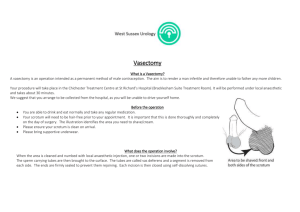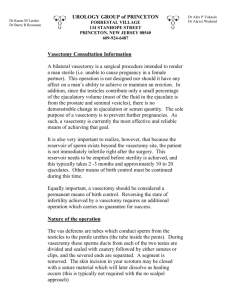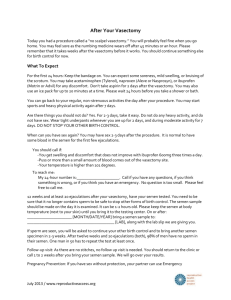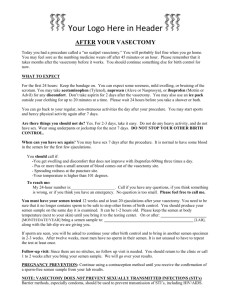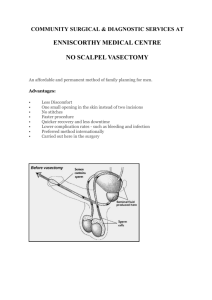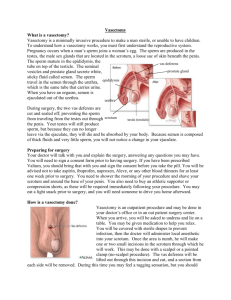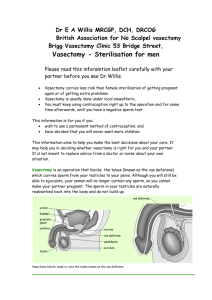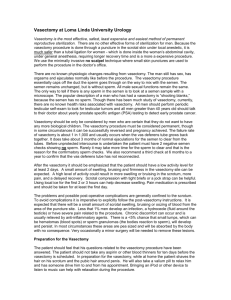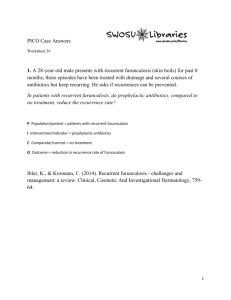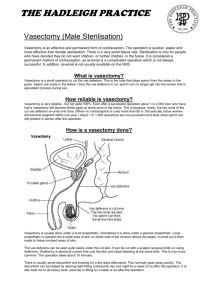No Scalpel Vasectomy - Mallow Primary Healthcare Centre
advertisement
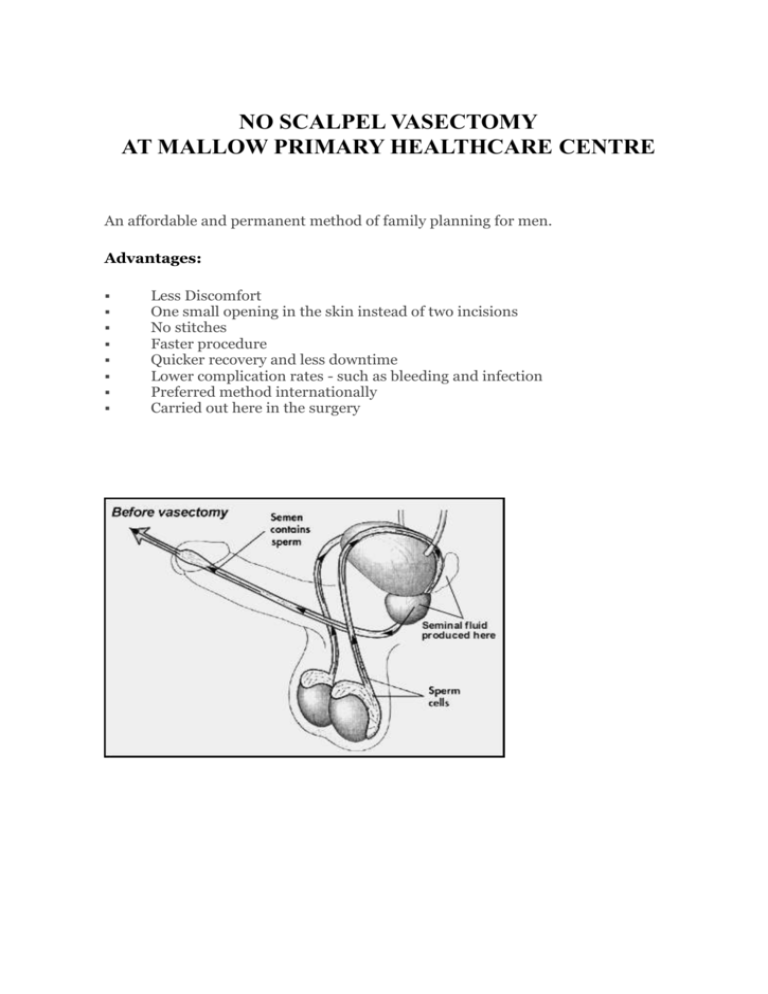
NO SCALPEL VASECTOMY AT MALLOW PRIMARY HEALTHCARE CENTRE An affordable and permanent method of family planning for men. Advantages: Less Discomfort One small opening in the skin instead of two incisions No stitches Faster procedure Quicker recovery and less downtime Lower complication rates - such as bleeding and infection Preferred method internationally Carried out here in the surgery Is a vasectomy right for me? You must be sure you do not want to father a child under any circumstances. It is important you talk to your partner and make this decision together. It may not be right for you if you are very young, your relationship is not stable, you are under a lot of stress, or you are having the vasectomy just to please your partner. No Scalpel Vasectomy - Why is it different? In a conventional vasectomy two incisions are made in the scrotum with a scalpel. The tubes are lifted out in turn and cut so the sperm cannot reach the semen, then the doctor stitches the wounds. In a no scalpel vasectomy the doctor locates the tubes under the skin, and holds them in place with a special clamp. Instead of making two incisions the doctor makes one tiny opening and reaches the tubes. The tubes are blocked using a cautery instrument. There is minimal bleeding with this method and no stitches are required to close this one tiny opening which heals quickly. The No scalpel vasectomy was developed in China, and is now regarded as the preferred method of male sterilization internationally. Dr Lynch underwent training in the UK by Dr Laurel Spooner, President of the Association of Surgeons in Primary Care. Is No Scalpel Vasectomy Safe? Yes, it is safe, but as with all surgery complications such as bruising, bleeding, infection, and scarring are possible. Serious complications are very rare. Less than 1 in 100 cases has even a minor problem. What are the risks again? Most men feel sore and tender for a few days after the operation, and will usually experience some bruising and swelling on or around their scrotum. However, in some cases, a vasectomy can cause more serious problems, some of which are outlined below. Haematoma - a haematoma is when blood collects and clots in the tissue surrounding a broken blood vessel. Following a vasectomy, you may develop a haematoma inside your scrotum. Haematomas are mostly small (pea-sized), but can occasionally be large (filling the scrotum) and, rarely, they can be very large. This can cause your scrotum to become very swollen and painful. In severe cases, you may need further surgery to treat the blood clot. Sperm granulomas - when the tubes that carry sperm from your testicles are cut, sperm can sometimes leak from them. In rare cases, sperm can collect in the surrounding tissue, forming hard lumps that are known as sperm granulomas. Your groin or scrotum may become painful and swollen either immediately or a few months after the procedure. The lumps are not usually painful and can often be treated using anti-inflammatory medication, which your GP will prescribe. If the granulomas are particularly large or painful, they may have to be surgically removed. Infection - after a vasectomy, you may be at risk of developing an infection as a result of bacteria entering through the cuts made in your scrotum. Therefore, after the operation, it is important to keep your genital area clean and dry to keep the risk of infection as low as you can. Long-term testicle pain - some men get pain in one or both of their testicles after a vasectomy. It can happen immediately, a few months or a few years after the operation. It may be occasional or quite frequent, and vary from a constant dull ache to episodes of sharp, intense pain. For most men, however, any pain is quite mild and they do not need further help for it. Long-term testicular pain affects around one in 10 men after vasectomy. The pain is usually the result of a pinched nerve or scarring that occurred during the operation. You may be advised to undergo further surgery to repair the damage and to help minimise further pain. Testicles feeling full - after a vasectomy, some men may develop the sensation that their testicles are "fuller" than normal. This is usually caused by the epididymis becoming filled with stored sperm. The epididymis is the long, coiled tube that rests on the back of each testicle. It helps to transport and store sperm. Any such feelings should pass naturally within a few weeks. However, speak to your GP if you are still experiencing fullness after this time. Fertility - in a very small number of vasectomy cases, the vas deferens reconnects over a period of time. This means that the vasectomy will no longer be an effective form of contraception. However, it is rare for this to happen. Does No Scalpel Vasectomy have a failure rate? It is estimated that after a vasectomy there is less than a 1 in 2000 chance of pregnancy. Do I need a referral? No. However it is desirable that you talk it over with your GP who is familiar with your medical history. If you wish to see us directly we will ask your permission to contact your doctor to ensure that there is no medical reason that would make it unsafe or unwise to have a vasectomy. How long will the No Scalpel Vasectomy take? Usually the procedure takes no longer than 30 to 40 minutes, however you can expect to be in the surgery for approximately 60 minutes. It is helpful if your partner can attend with you. You should not drive immediately after the procedure. Is it painful? Local anaesthetic is injected into the skin of the scrotum with some mild discomfort. Once the local starts working you should feel no pain. Afterwards you may feel some discomfort for a number of days and you may want to take some paracetamol. Discomfort is significantly less with the no scalpel method because there is less injury to tissue. Also there are no stitches inserted. When can I return to work? You should take 48 hours off after your vasectomy. If your job requires heavy lifting then you should take one week off to recover. We will provide your employer with a certificate at your request. Will Vasectomy change me as a man? The only thing that will change is that you will not make your partner pregnant. Your body will continue to make hormones that make you a man. You will have the same amount of semen. Vasectomy will not change your beard, your muscles, your libido, your erections or ejaculations. It is said that without the worry of pregnancy, and the hassle of other birth control methods, sex is more relaxed and pleasurable than before. Will I be sterile straight away? No. After a vasectomy there are always some live sperm left in your system. It takes approximately 20 ejaculations to clear them. You and your partner must use a reliable form of birth control until a semen sample has been tested 16 weeks after your operation, and confirmed free of sperm. It is vital that you wait for the results of the sperm test before stopping your method of family planning. Can I have sex immediately? It is advisable to wait one week, but remember to use a reliable form of contraception until you have received a letter confirming that you are sterile. Will Vasectomy cause any medical problems? World experts have conducted a number of studies on vasectomy which conclude that vasectomised men are no more likely than other men to develop heart disease, cancer or other illnesses. A recent study has suggested a link between vasectomy and development of prostate cancer in later life. Experts conclude that further research on this matter is required. What if I have a medical problem or had previous surgery? If you are on anticoagulants such as warfarin, apixiban, dagibatran, have a bleeding disorder or you have had surgery for undescended testicle(s), torsion of testicle or previous reversal of vasectomy, this procedure is best carried out in a hospital environment. Will it protect me from getting an STI or AIDS? No. It will only prevent you from making your partner pregnant. If you or your partner has an STI the best way to protect yourself and your partner is to use a condom. Can a No Scalpel Vasectomy be reversed? Vasectomies should be considered permanent. Reversal procedures are complex, expensive and carried out in specialist centres. Success rates are low and unpredictable. If this issue is on your mind then a decision to proceed is probably best postponed, or perhaps is not right for you. How much does it cost? €500 which includes initial consultation, procedure and follow up. Semen analysis can be conducted at a number of private laboratories for approx. €50 and is free with a medical card. Which doctor will I see? Dr. William Lynch MRCGP MICGP BANSV with a special interest in vasectomy. How do I get to Mallow Primary Healthcare Centre? From the Cork Road N20 take the exit marked Dromahane, Sugar Factory R638. Continue straight along this road and under the fly over heading for Mallow Town for 1.3km. Immediately after passing under the flyover take the second right into Mallow Business Park. Continue up the hill and take the second exit at the roundabout. Take the first exit left at the next roundabout and turn left into the car park. Welcome you are now at MPHC To book an appointment, contact us at: Mallow Primary Healthcare Centre Tel. 022 52944 www.mphc.ie June 2015
